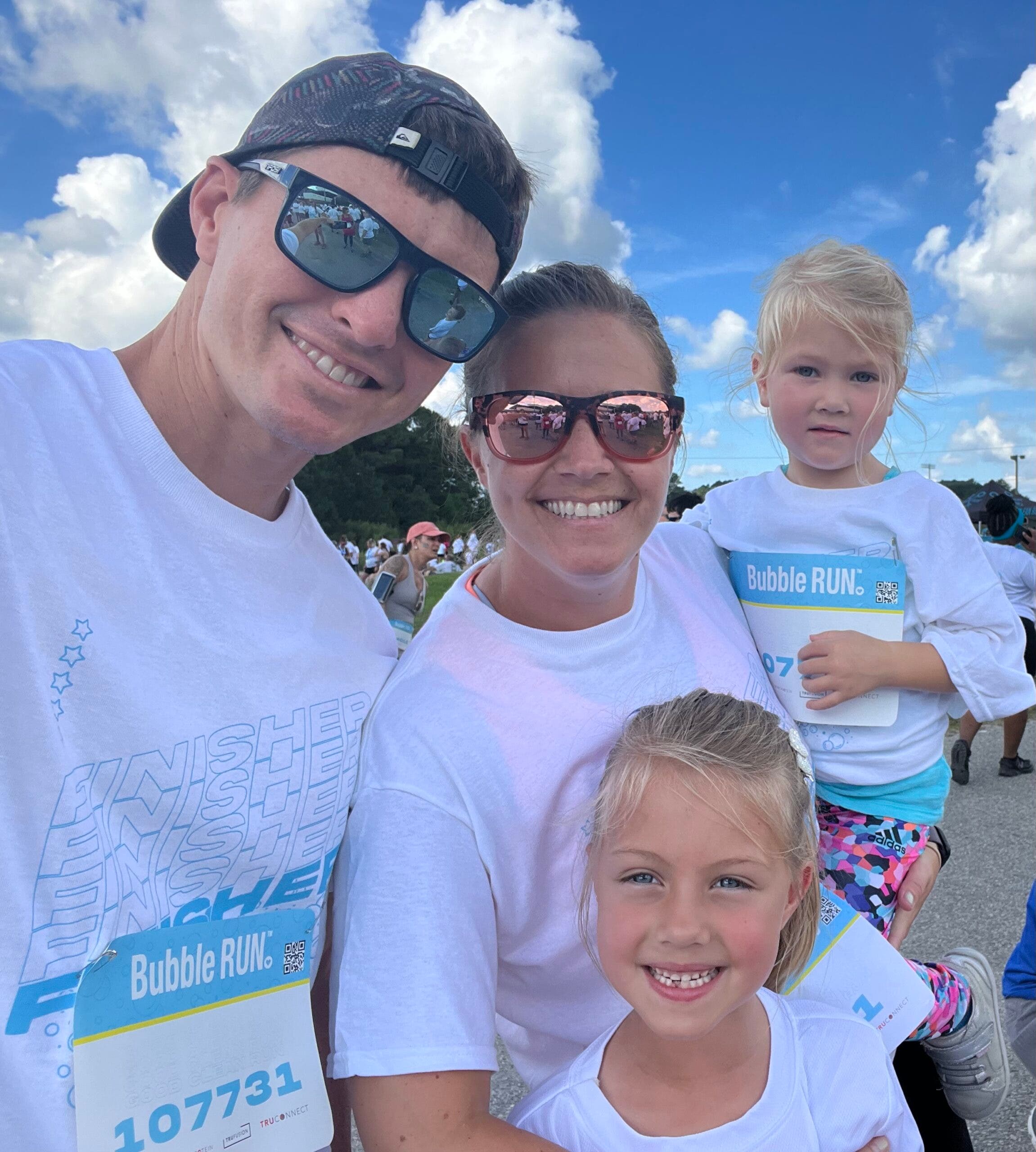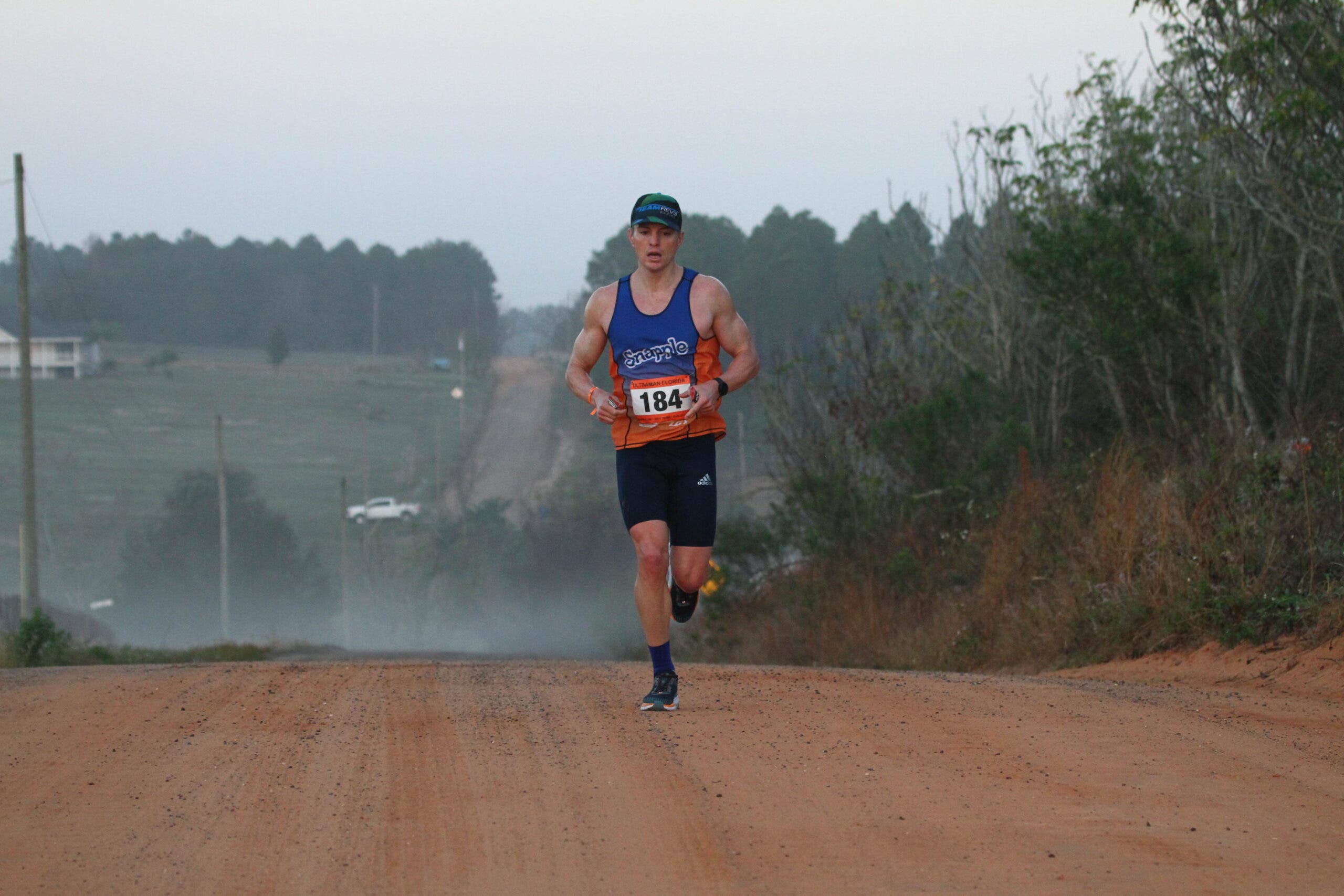27 Hours Per Week, Done by 6 A.M. - How Does Ultraman Steve Keller Do It?

(Photo: Courtesy of Steve Keller)
It’s 5 a.m. on a Friday and Steven Keller is wide awake. In fact, he’s been wide awake for hours—he’s 17 miles into his run workout. What registers as a “Night Run” on Strava is actually Keller’s morning workout: He just operates on a different body clock than most.
Many endurance athletes have logged a long run under the cover of darkness here, or a well-before-dawn session on the bike trainer there. Whether it’s a way of shoehorning a big workout into a busy schedule or getting it done before a big travel day, a 4 a.m. workout is a necessity on occasion. But for Keller, 36, these wickedly-early, generally lengthy workouts aren’t anomalies, they’re an everyday occurrence.
“The alarm’s set for 3:28 a.m. pretty much seven days a week, unless I wake up earlier on my own,” says Keller, who lives in Virginia Beach, VA. “I do longer workouts on the weekends, but I want to be home with the family. So I still start at 4 or earlier to be done by 9, and still have a majority of the day with them.”
It’s a rigid routine, but one that’s working for Keller, who’s one of the frontrunners leading into the Ultraman World Championships, which starts next Friday on the Big Island of Hawaii. It allows him to maintain the arduous training for the Ultraman event – which entails a three-day, 320-mile race, featuring a 6.2-mile swim and 90-mile bike on day one, a 171-mile bike ride on day two, and a 52.4-mile run on day three—all while working full-time as a veterinarian and being an equally dedicated husband to wife Ally and dad to two daughters, Maddy, 7, and Isabelle, 3.

RELATED: Your Ultimate Guide to Ultra Triathlon
“Ultraman requires a certain amount of volume and there are only so many hours in the day. Between unpredictable daycare closures or work hours that don’t always allow for a lunch break, the only consistent ‘me time’ is before the kids get up,” says Keller, a former collegiate soccer player turned triathlete who did his first ultra-distance event in 2019 (he placed second in his debut, and later won 2020’s Ultraman Florida 2020 and in Arizona last March). “My kids get up at 6 and I have to leave the house with at least one of them by 7 in order for me to make it to work by 8. I don’t train in the evenings because my wife and I usually don’t get home until 6. And life doesn’t get any calmer when you get home from work.”
Keller hasn’t always been so aggressive when it comes to his wakeups. Before kids—and before Ultramans—his alarm would be firmly set for 5 a.m., and he’d begin his workouts by 6. But once his older daughter was born, he gradually began shifting the start of his day back more and more. The old adage of “sleep when the baby sleeps” became “train while the baby sleeps” for Keller, who would cover the early-morning feeding for his newborn and then place her in a bouncy seat while he smashed pre-dawn sessions on the trainer. When daughter number two came around, he realized one simple truth: You just have to work with the time you have.
So for Keller, who is self-coached and does not follow a set training plan, that means logging an average of 244 miles of cycling and 56 miles of running per week—totalling some 20 hours—well before sunrise. Sometimes, like he did last Friday, he’ll slip out even before 3 a.m.. He does the majority of his rides on his trainer, saving the outdoor sessions for the weekends when he does his five-hour-plus rides, often capping them around 100 miles.
As for swimming? “That’s my biggest obstacle,” he says. “The pools just don’t open early enough for me.” So Keller finds pockets of time in his work day to fit in a swim session between patients, averaging about six hours (and 24,000 yards) in the pool every week. After dinner with his family and helping with his daughters’ bath and bedtime routine, he’s asleep by 9 p.m.—if he can last that long.
“I don’t always make it to my bed,” he shares. “Usually, I’ll fall asleep in my daughters’ room while I’m putting them to bed, or on the living room couch and wake up to my wife nudging me to wake up and get to bed.”
Working out while most of the world is asleep has its privileges. For one, there is little traffic in the rural areas around Virginia Beach where he trains, and Keller says he’s more apt to have an encounter with a deer than a car. But it’s also risky. A couple months back, Keller, who almost always trains alone, ran upon a carjacking in progress along his usual route in a typically quiet residential area.

“I always make myself known anytime I run up on people in the dark so I don’t surprise them, so as I came upon these three men in a driveway, I said, ‘Hey guys, how’s it going?.’ And that’s when I noticed that they were wearing all black, they had masks on and were breaking into the car.” His fight-or-flight reaction triggered, Keller dashed to the end of the street and called the police. (The men fled, but were not caught.)
It was the first time Keller experienced fear for his personal safety in the many years that he’s kept this rigid routine. And it’s not lost on him that his perspective would be completely different if he was a woman. Especially in the wake of the murder of Eliza Fletcher, who was kidnapped in September while running in Memphis, Tenn. around 4:00 a.m. As her death sparked an avalanche of clap-backs from women defending Fletcher’s decision to run in the dark, hardly anyone questioned Keller’s choice of training time.
“The carjacking happened around the same time as [Fletcher’s] murder, so my family did worry a bit about me at that point,” he says. “Maybe it’s just being naive, or that I stick to areas that are better lit and residential, or that I wear reflective gear, but I do have a level of subconscious comfort out there.”
Even after the carjacking scare, Keller was back at it the next day, just like usual. Missing a workout is not an option for him, even when he’s not really feeling it. “I’m just like anyone else, I definitely have days that I don’t want to do it. But I give myself a chance to start it,” he shares. “My bare minimum is to get up and start a workout. Even if it seems overwhelming and intimidating and more of a chore at times, I tell myself, just focus for two hours, and then you can relax.”
And, when you manage to finish a 17-mile run or a 50-mile ride by 5 a.m., you get that much more time to “relax”—or, in Keller’s case: Hustle to get in his second breakfast, help to get his girls off to daycare and school, then work a full day on his feet. Exhausting? No doubt. But for a man who prefers spending several of his waking hours alone in the dark, he has a rather sunny outlook on it all—and of course the results speak for themselves.
“Each sunrise is like a recharge. No matter how hard I’ve worked in the dark, once the sun comes up, it’s like I haven’t done anything at all, but in a good way,” Keller says. “It’s a chance to reset. It really feels like a brand new day.”
RELATED: Got What it Takes to Race Ultraman?